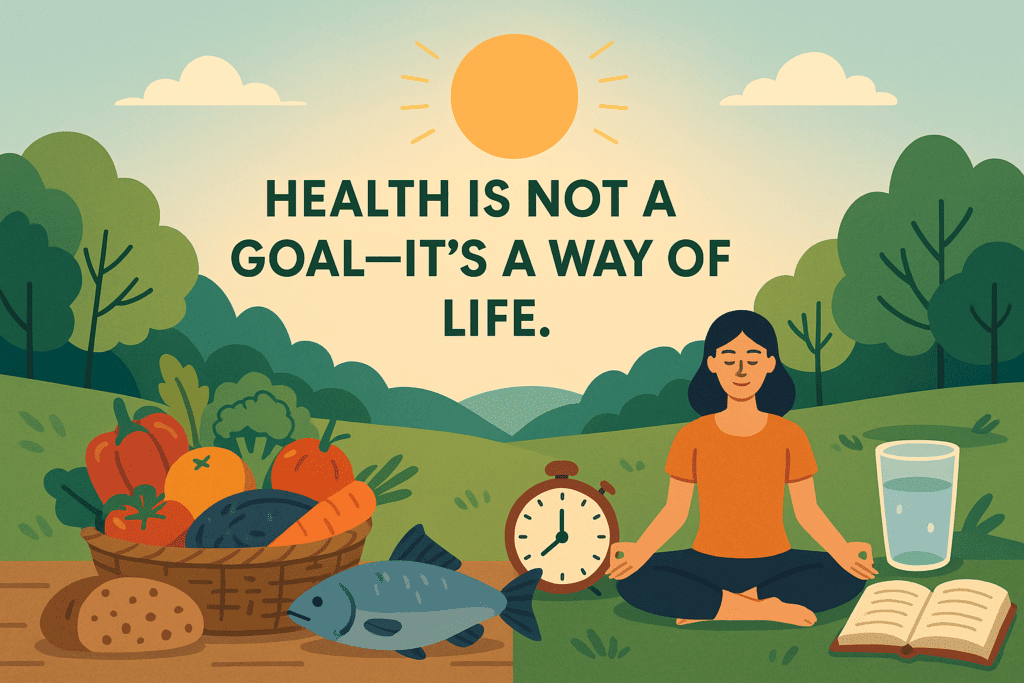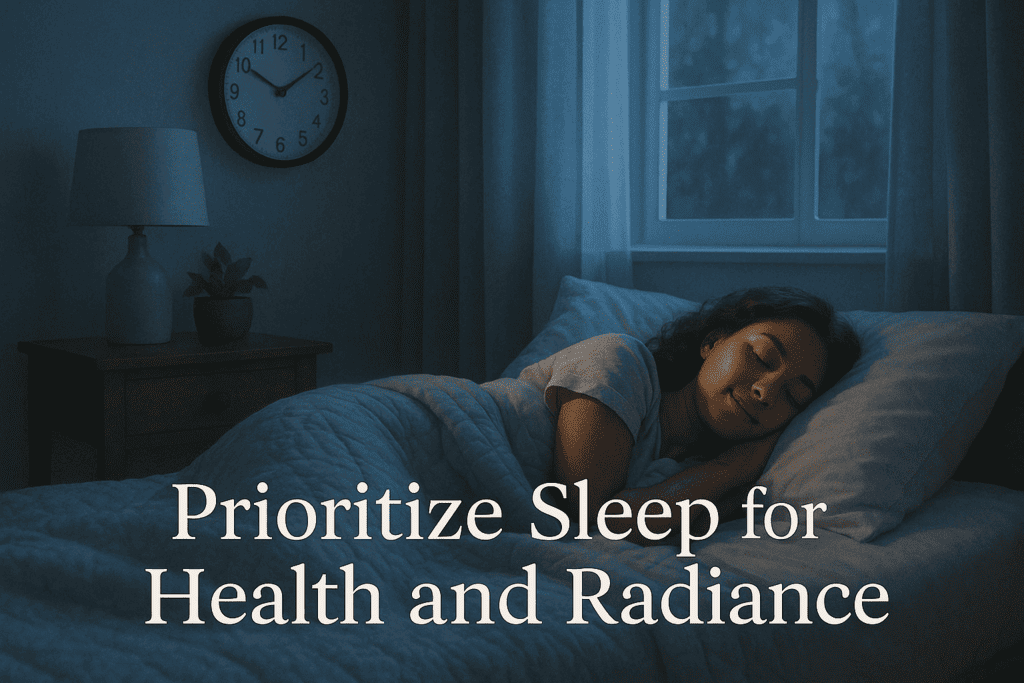
Introduction
Optimal health is not merely the absence of disease but a dynamic state of physical, mental, and social well-being. Achieving this state requires a holistic approach encompassing various lifestyle factors. Recent studies have highlighted the profound impact of lifestyle choices on health outcomes, emphasizing the importance of a balanced diet, regular physical activity, adequate sleep, stress management, and preventive healthcare. This guide delves into these foundational elements, providing evidence-based strategies for fostering optimal health.

I. Nutrition : The Cornerstone of Health
A balanced diet is pivotal in maintaining health and preventing chronic diseases. The 2023–2024 Healthy Living Guide by Harvard’s Nutrition Source emphasizes the importance of a diet rich in fruits, vegetables, whole grains, lean proteins, and healthy fats. These foods provide essential nutrients that support bodily functions and reduce the risk of conditions like heart disease and diabetes The Nutrition Source.
Key Dietary Guidelines :
- Emphasize plant-based foods : Incorporate a variety of fruits, vegetables, legumes, and whole grains.
- Choose healthy fats : Opt for unsaturated fats found in nuts, seeds, and olive oil.
- Limit processed foods : Reduce intake of sugary beverages, refined grains, and trans fats.
- Moderate animal products : Include lean meats and low-fat dairy in moderation.
A study published in Nature Medicine in 2025 found that dietary patterns rich in plant-based foods, with moderate inclusion of healthy animal-based foods, may enhance overall healthy aging. The research suggests that higher intakes of fruits, vegetables, whole grains, unsaturated fats, nuts, legumes, and low-fat dairy products were linked to greater odds of healthy aging Nature.

II. Physical Activity : Enhancing Longevity and Quality of Life
Regular physical activity is integral to optimal health. The American Heart Association reports that adults with heart-healthy metrics, including regular exercise, have better health outcomes across various bodily systems American Heart Association.
Recommended Physical Activity Guidelines :
- Aerobic exercises : Engage in activities like walking, cycling, or swimming for at least 150 minutes per week.
- Strength training : Incorporate muscle-strengthening activities on two or more days per week.
- Flexibility exercises : Include stretching or yoga to enhance flexibility and balance.
A study in Lifestyle Medicine highlighted that regular physical activity, maintenance of a healthy body weight, and not smoking are key components of a healthy lifestyle, significantly reducing the risk of chronic diseases PMC.

III. Sleep : The Unsung Hero of Health
Adequate sleep is crucial for physical and mental restoration. The Centers for Disease Control and Prevention (CDC) recommends that adults aim for 7–9 hours of sleep per night to support optimal health.
Strategies for Improving Sleep Quality :
- Establish a sleep routine : Go to bed and wake up at the same time every day.
- Create a conducive sleep environment : Keep the bedroom cool, dark, and quiet.
- Limit screen time : Avoid electronic devices at least an hour before bedtime.
- Be mindful of food and drink : Avoid large meals, caffeine, and alcohol close to bedtime.
Research has shown that insufficient sleep is associated with various health issues, including obesity, heart disease, and depression.

IV. Stress Management : Balancing the Mind and Body
Chronic stress can adversely affect health, leading to conditions like hypertension and weakened immune function. Effective stress management techniques are essential for maintaining well-being.
Effective Stress Management Techniques :
- Mindfulness and meditation : Practices that promote relaxation and mental clarity.
- Physical activity : Regular exercise can reduce stress hormones and improve mood.
- Social support : Engaging with friends and family provides emotional support.
- Time management : Organizing tasks can reduce feelings of overwhelm.
A study published in PMC in 2023 emphasized the importance of promoting healthy living behaviors, including stress management, to improve health outcomes globally PMC.
V. Preventive Healthcare : Proactive Measures for Health Maintenance
Regular health screenings and check-ups are vital components of preventive healthcare. They facilitate early detection of potential health issues, allowing for timely intervention.
Essential Preventive Healthcare Practices :
- Regular screenings: Participate in recommended screenings for blood pressure, cholesterol, and cancer.
- Vaccinations: Stay up-to-date with immunizations to prevent infectious diseases.
- Health assessments: Undergo routine physical exams to monitor overall health status.
The American College of Lifestyle Medicine advocates for integrating preventive healthcare into regular practice to reduce the incidence of chronic diseases and enhance quality of life lifestylemedicine.org.
Conclusion
Achieving optimal health is a multifaceted endeavor that requires a commitment to balanced nutrition, regular physical activity, adequate sleep, effective stress management, and preventive healthcare. By adopting these foundational principles, individuals can enhance their quality of life and reduce the risk of chronic diseases.
Summary Table: Foundations of Optimal Health
| Foundation | Key Practices |
|---|---|
| Nutrition | Emphasize plant-based foods, choose healthy fats, limit processed foods |
| Physical Activity | Engage in regular aerobic and strength exercises, incorporate flexibility training |
| Sleep | Aim for 7–9 hours per night, establish a consistent sleep routine |
| Stress Management | Practice mindfulness, engage in physical activity, seek social support |
| Preventive Healthcare | Participate in regular screenings, stay updated with vaccinations, undergo routine health assessments |
Incorporating these practices into daily life can lead to sustained health benefits and a higher quality of life. Remember, small, consistent changes can make a significant impact on your overall well-being.
References
- Harvard T.H. Chan School of Public Health. (2024). Healthy Living Guide 2023/2024. Retrieved from https://nutritionsource.hsph.harvard.edu/2024/01/02/healthy-living-guide-2023-2024/
- American Heart Association. (2025). Adults with heart-healthy metrics had better health from head to toe. Retrieved from https://newsroom.heart.org/news/adults-with-heart-healthy-metrics-had-better-health-from-head-to-toe
- Centers for Disease Control and Prevention. (2025). How Much Sleep Do I Need?. Retrieved from https://www.cdc.gov/sleep/about_sleep/how_much_sleep.html
- American College of Lifestyle Medicine. (2025). Lifestyle Medicine: The Health Promoting Power of Daily Habits. Retrieved from https://lifestylemedicine.org/
- National Institutes of Health. (2023). A united approach to promoting healthy living behaviours and associated health outcomes: a global call for policymakers and decisionmakers. Retrieved from https://pmc.ncbi.nlm.nih.gov/articles/PMC10112301/







